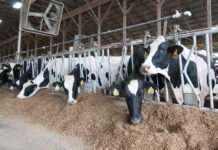As reported in High Plains Journal the U.S. Department of Agriculture is investing up to $2.8 billion in 70 selected projects under the first pool of Partnerships for Climate-Smart Commodities, in an announcement made Sept. 15 by Agriculture Secretary Tom Vilsack at River Falls, Wisconsin, as he touted the initiative.
Truterra LLC, Minneapolis, Minnesota, the sustainability business of Land O’Lakes, Arden Hills, Minnesota, was the recipient of a $90 million in funding and is the only project that reaches a national scale. President Tom Ryan with Truterra LLC, and Land O’Lakes President and CEO Beth Ford made brief remarks. Ford called the partnership “visionary and forward thinking
Vilsack said farmers and ranchers face many challenges as a result of climate changes from drought, derechos, floods and forest fires. Farmers and ranchers take stewardship seriously, and the program will benefit them by providing expanded markets and revenue streams while allowing them to continue to produce food for U.S. and global consumers.
The federal monies will be leveraged with nonfederal funds and work with more than 50 universities, which will help advance, educate, monitor, measure, report and verify results.
A statement from Truterra said for farmers the project would mean:
• Increased agronomic support delivered through the network of project partners and ag retailers;
• Access and guidance to existing public funding opportunities to ease financial burden of increasing and adding on-farm practices changes; and
• Strengthened verification of and data-entry support for climate-smart practice changes on commodity crops to enable participation in ecosystem services markets such as Truterra’s carbon market.
The project will use initial funding from USDA—and eventually self-funding through the sale of climate-smart commodities and ecosystem credits—to provide farmers and ranchers a fuller package of infrastructure and cost-sharing resources to help them transition to climate-smart practices, according to Truterra.
It comes at a time when consumers in the U.S. and around the world are wanting to know how their food is produced and they can be armed with the knowledge that harmful emissions are being reduced, Vilsack said. He says about 50 million metric tons of carbon dioxide will be sequestered, which will be the equivalent of removing more than 10 million gasoline-powered vehicles over the road for one year.
It will reach 50,000 farmers and cover 20 million to 25 million acres of land with practices such as cover crops, no-till and nutrient management.
According to the USDA, South Dakota State University will take the lead on a project to create market opportunities for beef producers who use climate-smart agriculture, grazing and land management practices and help them manage data to improve decision making and meet market demand for commodity markets. The Dairy Farmers of America will serve as a partner for connecting on-farm greenhouse gas reduction with low-carbon dairy market opportunity. DFA will use its cooperative business model to ensure collective financial benefits are captured at the farm to create self-sustaining circular economy model.
A partnership with Oregon Climate Trust will address the need to expand and recover the nation’s forests while balancing the demand for wood products. It recognizes the increasing need for forests to serve as carbon reservoirs.
The USDA is also evaluating project proposals for a second Partnerships for Climate-Smart Commodities funding pool, which includes funding requests from $250,000 to $5 million that will emphasize small and/or underserved producers. Funding will be announced later this fall.
Other major announcements included a Houston, Texas, company, Arva Intelligence, which had three proposals selected for the USDA’s new initiative to fund sustainability and climate solutions in agriculture. Arva will work with USA Rice Federation, Winrock International Institute for Agriculture Development and Global Clean Energy Holdings in these projects.
Arva will be providing its cloud-based, machine learning-enabled software to collect data and validate on-farm regenerative practices undertaken by participants. Use of the Arva platform will support the initiative to create value-added marketing opportunities for these farmers’ commodities by providing a robust and validated data set that supports farmer activities. This dataset will provide integrity and assurance, leading to de-risked carbon intensity and sustainability claims on which CPG and other buyers can depend. Here is a summary of the projects:
• Rice Stewardship for Climate-Smart Commodities, $80 million funding ceiling. This project will build climate-smart rice markets and work to reduce methane emissions in rice production through the adoption of alternate wetting and drying, furrow irrigation, and other climate-smart practices and support underserved producers by improving critical infrastructure necessary to implement climate-smart practices in the future.
• Growing Value for Producers, $20 million funding ceiling. This project will create and pilot-test a farmer-friendly system that builds capacity with institutions interacting with a range of producers, including underserved producers, to support adoption of climate- smart practices and interact with commodity buyers in climate-smart markets.
• Climate-Smart Camelina, $30 million funding ceiling. This large-scale pilot project aims to measure and validate the climate-smart advantages of camelina sativa in both rotational and winter cover crop production systems and build associate climate-smart biofuels markets. The project will accelerate farmer adoption of camelina as a nonfood crop grown on idle acres to produce more plant-based feedstock for renewable biofuels and chemicals with low carbon intensity and no land-use change while increasing carbon capture in the soil.
Funding questioned
House Agriculture Committee Vice Chair Glenn “GT” Thompson, R-PA, questioned the funding mechanism for the climate investment, which taps into the Commodity Credit Corporation.
“The Biden administration is unilaterally spending billions of dollars without congressional input. While I am sure there worthy projects, USDA is abusing the authorities of the Commodity Credit Corporation to stand up a ‘pilot program’ while ignoring the significant issues facing farmers and ranchers,” Thompson said. “It’s as though Secretary Vilsack is intent on having Congress once again limit his ability to use the CCC.”



